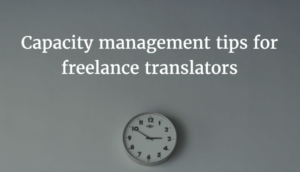Capacity management tips for freelance translators
By Oleg Semerikov (@TranslatFamily)
Reblogged from LinkedIn with permission from the author (incl. the image)
 So your translation business is going well. You’ve got a reliable set of customers who you like and work well with, and projects are coming in on a regular basis. You’re living the freelancer’s dream of steady self-employment. And then one morning, you look at your to-do list and do a double take. You have to do how much work today?
So your translation business is going well. You’ve got a reliable set of customers who you like and work well with, and projects are coming in on a regular basis. You’re living the freelancer’s dream of steady self-employment. And then one morning, you look at your to-do list and do a double take. You have to do how much work today?
Finding yourself over capacity is something that happens to every freelancer occasionally. It’s a bit of a mixed blessing, to say the least. On the one hand, you know you have work – and therefore money – coming in. But on the other, it can be difficult to look on the bright side when you’re forced to keep working late into the night, fretting about missing deadlines or making mistakes because you’re in a rush. So, in hopes of helping you deal with the problem next time it comes up, we’re here to offer a few handy tips on how to manage your capacity and maybe even de-stress a little.
Although our very first tip is to clear your current workload before settling down to read this article, we hope those of you with a few minutes to spare will read on and enjoy!
Don’t panic!
Yes, we know that’s the last thing a panicking person actually wants to hear. Yes, we know that on-time delivery is a key part of quality customer service – but it’s going to be OK. Trust us. You’re a professional, which means you have the expertise and the skills needed to handle this problem. And even if you do overshoot the deadline slightly, it’s not the end of the world – and we’ll discuss how to handle that situation later in this article.
At the moment when you realise you’ve taken on too much work, it can seem like a disaster, but there’s no sense wasting time by beating yourself up over it. The best thing you can do is make yourself a hot drink, sit down and put those translating skills to work.
Don’t compromise on quality
If the deadline crunch is looming and it’s looking like you can’t get everything done in time, it can be very tempting to rush through a translation, sacrificing quality to get it done quickly. That’s almost never the correct decision. After all, a translation’s life cycle doesn’t end when you deliver it; it still has to be usable by the customer.
A better solution would be to keep the customer in the loop. Apologise, notify them of the delay, and give them a revised estimate of when the document will be ready – and do this as soon as you can, so that they can make a decision about how to handle the situation on their end.
Ideally, of course, you don’t want to let it get to that stage at all. So what can you do to avoid missing deadlines in the first place?
Know your capacity
Observe your own working processes over a period of days and weeks, and keep track of how quickly you’re able to turn a translation around. Measure your results in terms of words per hour or day. Chances are, you’ll start to see a pattern emerging which will allow you to determine how quickly you actually work. Needless to say, this is a much better approach than just guessing, or assuming that a customer’s suggested deadline is feasible without checking it for yourself. Measuring your actual output rate will make it easier for you to provide quotes and estimate how long a given translation will take to complete, which will come in very handy when negotiating rates and deadlines.
Keep an organised calendar
Make a list of everything you’re working on. Write down every job you’ve been given, when it was assigned to you, when it’s due, and how large it is. Then, based on your translation-speed calculations, allocate a block of time in your calendar for working on it. This could be a paper calendar hanging on the wall, but a digital one is even better for updating details, moving projects around, and finding items with a simple search. These days, there are plenty of software products that can help with this. Most modern email software includes calendar functionality, including the reliable old standby Microsoft Outlook, or alternatively you could use a free cloud-based solution like Google Calendar.
However you choose to organise your work, keeping it all together in one place will help you plan ahead and understand how much spare capacity you have for other jobs that come in.
Don’t be afraid to say no
If too much work does come in and you simply don’t have the time to handle it all, don’t be afraid to turn the occasional job down. Most agencies would rather that you be honest with them and tell them when you don’t have time to handle a specific project, instead of accepting it now and having to delay delivery later. Think of it the same way as you would if you were offered a job you couldn’t take because it was outside your field of specialisation: saying no is sometimes a sign of professionalism, and worthy of respect. Besides, if they really want you, specifically, to take the job, then they may be able to offer you an extended deadline. It never hurts to ask!
In the end, it all boils down to a simple rule: think ahead. If you’re aware of your responsibilities and able to plan your work beyond your next few hours and days, you shouldn’t have to deal with these kinds of problems very often – if ever. But tips like these may help even if you’re already the fastest, most organised translator on Planet Earth. After all, one of the great benefits of being a freelancer is your flexibility: if you feel like earning a little extra money, you can always put in a few extra hours here and there. Planning your work ahead of time lets you manage those extra hours, as well, keeping stress levels down and productivity up. And your customers receive the translations they need, exactly when they need them – so everybody wins!
Author bio
 Oleg Semerikov started as an English to Russian freelance translator ten years ago. Nowadays, he runs his own company, Translators Family, a boutique translation agency specialising in Russian, Ukrainian and Polish, with expertise in English, German, and other European languages. Many long-term customers of Oleg as a freelancer became the permanent customers of his agency. Translators Family on social media: Facebook, Twitter, Google+
Oleg Semerikov started as an English to Russian freelance translator ten years ago. Nowadays, he runs his own company, Translators Family, a boutique translation agency specialising in Russian, Ukrainian and Polish, with expertise in English, German, and other European languages. Many long-term customers of Oleg as a freelancer became the permanent customers of his agency. Translators Family on social media: Facebook, Twitter, Google+
